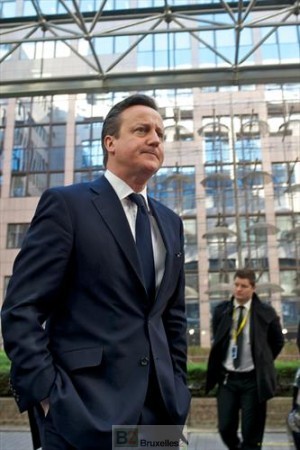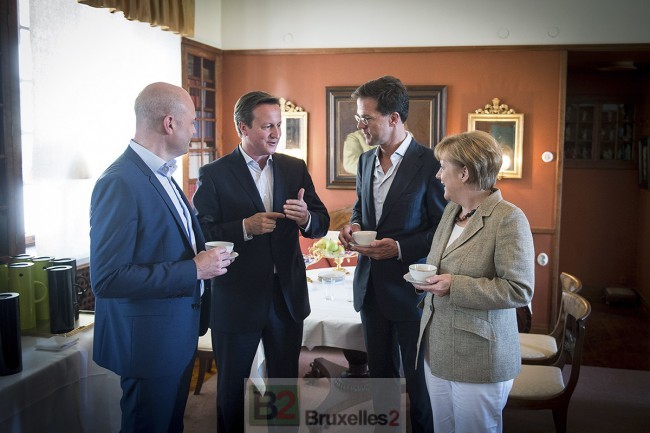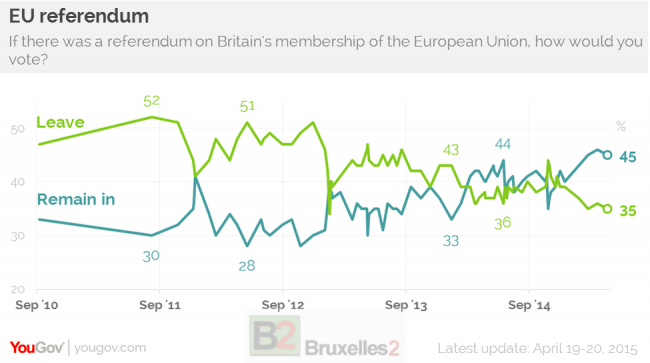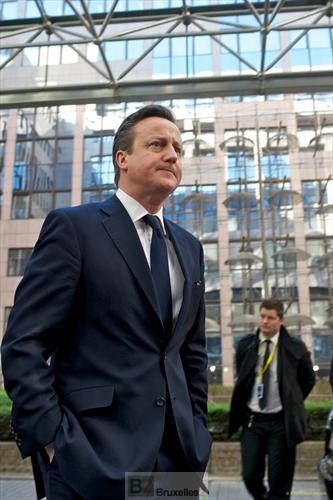Brexit or not. Cameron's (and London's) loss of influence in Europe

(BRUSSELS2) Britain's desire to hold a referendum on the European Union is a fine exercise in democracy. And he should be hailed. But the United Kingdom's desire to bend Europe to the yardstick of its own interests is much more debatable. It also badly hides a clear disappearance of the Kingdom on the European scene. The United Kingdom is losing interest in Europe more and more... and the Europeans are making less and less effort to dissuade it.
The symbolic defeat of June 26
By opposing the appointment of Jean-Claude Juncker in June 2014, Prime Minister David Cameron was not wrong in his rights. The European Council has as much power as the European Parliament to appoint the President of the Commission. It is even the only prerogative of the "Chefs": that of proposing a name. But by doubling this requirement with a desire to transform Europe according to its own vision, that is to say the least integrated possible, the least effective, the least attractive possible, it somehow diverted the power given. The British Prime Minister failed to change the decision unlike his predecessors – John Major had blocked the candidacy of Jean-Luc Dehaene and Tony Blair had reiterated, ten years later, by blocking that of Guy Verhofstadt. We can invoke a change of era. Without a doubt. But for David Cameron, this vote was above all a real snub which is indicative of a deeper political decline. The Juncker case is, in fact, not an epiphenomenon. The British leader has a problem, today, with the other European countries... all the European countries. The British, now a minority on the European scene, have lost their influence... Their ability to play their particular little music has vanished.
Where has the virtue of British particularism gone?
This British erasure is recent. Absent from several fundamental policies — the budgetary treaty, the Euro Zone, much of the justice and home affairs policy, etc. — the United Kingdom had nevertheless retained a major role up to now et engine of European politics. Playing the role (sometimes beneficial) of hair-to-scratch, pointing out certain complexities or inconsistencies of European policy, pushing for more market, pragmatism, London played its part. Even in the policy of regulating financial services, which is difficult to carry out, the United Kingdom has skilfully helped to build European policy by blocking certain reforms deemed too negative.
What happened to trainability?
The British had always succeeded so far in dragging behind their positions a certain number of States, sometimes important, sometimes less, but never negligible. Their desire to enlarge Europe (to dilute it) met with some approval ten years ago. The intervention in Iraq in 2003 was symbolic in this respect. Eight countries had followed Tony Blair in a joint letter. Around the same time, the negotiation of the 2007-2013 financial perspectives and the questioning of certain policies (agricultural, regional, etc.) in favor of competitiveness policies had put France and the "Latins" in the minority, reduced on the defensive. The United Kingdom was then one of the only countries to open its labor market (without constraint) to workers from Eastern Europe who had just joined.
A loss of strategic influence
Ten years later, since the Eurosceptic turn of the Cameron team, and the isolations in series, this attraction is well and truly over. The British can no longer drag behind them a sufficient weight of countries. The negotiation of the 2014-2020 financial framework did not succeed in influencing policies in the direction desired by the United Kingdom at the time. His position of seeing Europe expand further eastwards (Georgia, Moldova, Ukraine, etc.) no longer receives general approval and has become a minority position. " The place of the United Kingdom is less strategic than 5-6 years ago notes an experienced diplomat. In the Council of the EU, in many debates, the British Minister does not intervene ". In this, it follows a policy set at the highest level. Didn't David Cameron boast in an article of two feats of arms at European level: the policies he had succeeded in blocking, those in which he did not participate. " It is difficult then to be at the center of the game when you consider that you do not want to participate in a European policy ».
How to get angry with friends
London's position against the common agricultural policy, against regional policy, against an excessively large European budget, against police or judicial cooperation, against free movement have upset more than one country, more than one government who often were very close to British ideas or, at least, admired its history, its democratic model, its economic dynamism. The diatribes of UKIP but also of government representatives, Tories in the lead, against the free movement of workers within the European Union, in particular workers from the East, (a fundamental principle of Europe.. . and Great Britain since the Second World War!), have done more damage than any French Exocet. They have deeply upset populations and governments in Eastern Europe and have lost solid friends.
A country in search of new allies
The attempts of the British Prime Minister to create alliances are rather quickly in the water. We remember this meeting in Sweden with his Swedish (Reinfeldt), Dutch (Rutte) and German (Merkel) counterparts in June 2014. In the meantime, one of his allies lost the elections. And even in Berlin, the Briton is no longer in progress. " Cameron thought he found support in Merkel on several occasions. Each time he was disappointed. The result is even the opposite. The language is " same harder in Berlin “, notes our interlocutor, with regard to the Briton than in other capitals.

An increasingly relative external weight
This obliteration is also visible on the exterior plane. In July 2013, on a subject that was "easy" for London - should a European military headquarters be created? — the United Kingdom thus finds itself isolated, only Lithuania comes to its rescue and still timidly. It is thanks to his right of veto and because no one wants to put "corner" William Hague that London imposes its blocking. London's participation in the definition of a European defense policy is now very limited. And the weight of London in European peacekeeping operations, very symbolic, less than what a Baltic country can contribute! More recently, London was completely absent from the negotiations initiated by Paris and Berlin, between Ukraine and Russia, in the "Normandy" format, resulting in the Minsk agreements 1 and 2 (read: Minsk Agreements: Why is the Franco-German couple more effective?). On Syria, the "pas de deux" started with France for an intervention then the withdrawal and alignment with the Americans did not really help in understanding British diplomacy.
The referendum maneuver
By organizing a referendum, London therefore intends to practice a classic blackmail: change Europe according to our wishes otherwise "we break the house", by aiming first and foremost at the free movement of citizens within the EU. The blackmail is clear. Because we do not see, in fact, how a referendum (if it were organised) could not result in a "No" to Europe (1). By making use of this latent hostility animated, for years, by a "popular" press which fires red balls at Europe (often in bad faith), this maneuver aims not only to satisfy its electorate but to overturn the European table , to recover some of the power and influence lost in recent years.
At the end of the blackmail, the door?
Giving in this time would not only run counter to a certain soul of European construction, it would also be giving in to the majority — from Lisbon to Gdansk, from Helsinki to Varna — which is today seeking a more integrated and united Europe. Discussions are often heated within the "European family". Decisions are not easy, consensuses difficult to dissect and compromises seem unambitious. But this construction has room to move forward. However, instead of strengthening Europe, each time we give in, each time we back down from British blackmail, we legitimize the debate, we strengthen its position, and we give it additional reasons to demand more in the "unraveling" of this integration. We are not in any way lowering the desire to leave Europe (Brexit). This is definitely not the right path. It will be necessary, at some point, for the British, and not the Europeans, to choose and assume their choice: to be in Europe or not to be!
(Nicolas Gros-Verheyde)
(1) In recent polls, opinions have come closer giving the Yes or the No side by side, or even the winning Yes. However, this phenomenon must be put into perspective. On the one hand, this is just a very anticipatory poll. The referendum would be organized in 2017, when the government will be in full exercise. Then, the experience of referendums on Europe shows that if the "Yes" vote often wins when we are far from the deadline, the trend is generally reversed in the last months or weeks before this one. This tightening also takes into account the promises of the candidates to obtain a limitation of the free movement of people and the important guarantees of Europeans, which is not yet completely acquired...



Beautiful subject very well treated! Thanks Nicholas!
We are used to British blackmail before major European meetings (especially before the adoption of the financial perspectives, but not only)! The worst part is that this blackmail always pays off! So why not continue? Regarding the supposed loss of influence of the UK in major European issues, it is largely compensated by the increase in US influence…. including in the takeover of the most strategic companies of the future... If it were enough to blackmail by threatening to hold a referendum on its country's membership of the EU to increase its influence, then France would have to hurry to plan one...
To paraphrase JC Juncker “Running constantly behind (the English) does not allow you to talk to them: you only see them from behind”.
ping: British Elections, or the Illustration of a National Malaise | politipond